
The Bolivarian National Armed Forces of Venezuela are controlled by the Commander-in-Chief and the Minister of Defense. In addition to the army, navy, and air force there is also a national guard and national militia primarily focused on internal security.

The Bolivarian Revolution is an ongoing political process in Venezuela that was started by Venezuelan President Hugo Chávez, the founder of the Fifth Republic Movement and later the United Socialist Party of Venezuela (PSUV), and his successor Nicolás Maduro. The Bolivarian Revolution is named after Simón Bolívar, an early 19th-century Venezuelan revolutionary leader, prominent in the Spanish American wars of independence in achieving the independence of most of northern South America from Spanish rule. According to Chávez and supporters, the Bolivarian Revolution seeks to build an inter-American coalition to implement Bolivarianism, nationalism and a state-led economy.

The following is an alphabetical list of topics related to Venezuela.

Plan Ávila is a military contingency plan by the Venezuelan Army to maintain public order in the Venezuelan capital, Caracas. The plan was first implemented in 1989 by the Carlos Andrés Pérez government in response to the Caracazo riots, where hundreds were killed by military and armed police. President Hugo Chávez also ordered activation of the plan in response to the 11 April 2002 Llaguno Overpass events, but high-ranking members of the Armed Forces refused to carry out the plan, wanting to avoid a massacre like the Caracazo.

The president of Venezuela, officially known as the president of the Bolivarian Republic of Venezuela, is the head of state and head of government in Venezuela. The president leads the National Executive of the Venezuelan government and is the commander-in-chief of the National Bolivarian Armed Forces. Presidential terms were set at six years with the adoption of the 1999 Constitution of Venezuela, and presidential term limits were removed in 2009.

The Bolivarian Army of Venezuela, is the land arm of the National Bolivarian Armed Forces of Venezuela. Also known as Bolivarian Army, its role is to be responsible for land-based operations against external or internal threats that may put the sovereignty of the nation at risk. The army is the second largest military branch of Venezuela after the Bolivarian Militia.
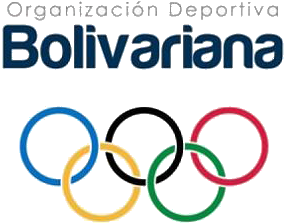
The Bolivarian Games are a regional multi-sport event held in honor of Simón Bolívar, and organized by the Bolivarian Sports Organization. The event is open to athletes from Bolivia, Colombia, Ecuador, Panama, Peru, and Venezuela. In 2010, the ODEBO decided to include Chile as the seventh member of ODEBO. Except Panama, all other participating countries are Andean states.

Bolivarian propaganda is a form of nationalist propaganda, especially in Venezuela and associated with chavismo, Venezuelan socialism. This type of propaganda has been associated with Hugo Chávez's Bolivarian Revolution, which used emotional arguments to gain attention, exploit the fears of the population, create external enemies for scapegoat purposes, and produce nationalism within the population, causing feelings of betrayal for support of the opposition.
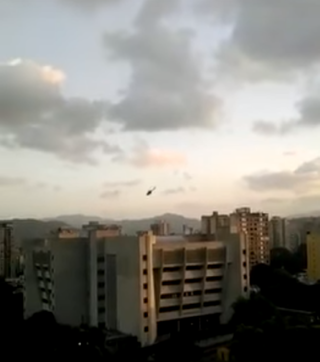
On 27 June 2017, there was an incident involving a police helicopter at the Supreme Tribunal of Justice (TSJ) and Interior Ministry in Caracas, Venezuela. Claiming to be a part of an anti-government coalition of military, police and civilians, the occupants of the helicopter allegedly launched several grenades and fired at the building, although no one was injured or killed. President Nicolás Maduro called the incident a "terrorist attack". The helicopter escaped and was found the next day in a rural area. On 15 January 2018, Óscar Pérez, the pilot and instigator of the incident, was killed during a military raid by the Venezuelan army that was met with accusations of extrajudicial killing.

Óscar Alberto Pérez was a Venezuelan investigator for the CICPC, Venezuela's investigative agency. He was also an actor in a film to promote the role of detectives in the CICPC. He is better known for being responsible for the Caracas helicopter incident during the 2017 Venezuelan protests and the 2017 Venezuelan constitutional crisis. His killing in the El Junquito raid received worldwide attention by the media and the political establishment, and was met with accusations of extrajudicial killing.

The El Junquito raid was a police and military raid that occurred on 15 January 2018 in El Junquito, Capital District, Venezuela, which resulted in the death of rebel Óscar Alberto Pérez and members of his movement.

El Helicoide is a building in Caracas, Venezuela owned by the Venezuelan government and used as a facility and prison for both regular and political prisoners of the Bolivarian National Intelligence Service (SEBIN). In the shape of a three-sided pyramid, it was originally constructed as a shopping mall, but never completed.
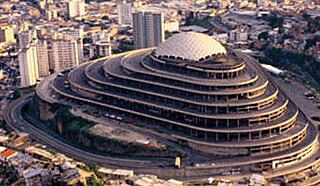
Torture in Venezuela has been a consistent phenomenon throughout its history. Various dictatorships from the Spanish colonial era into the twentieth century utilized torture against common criminals and political opponents. In the twentieth century, torture was common during the dictatorships of Juan Vicente Gómez and Marcos Pérez Jiménez. Torture also took place occasionally during Venezuela's democratic period, particularly during social outbursts, such as during the Caracazo and the 1992 coup attempts.

An investigation by the International Criminal Court (ICC) to analyze possible crimes against humanity committed in Venezuela was opened in 2021. A preliminary examination was initially opened in 2006, and closed after concluding that the requirements to start an investigation had not been met. In February 2018, the ICC announced that it would open preliminary probes into alleged crimes against humanity performed by Venezuelan authorities since at least April 2017. In 2020, the Office of the Prosecutor of the ICC stated that it believed there was a "reasonable basis" to believe that "since at least April 2017, civilian authorities, members of the armed forces and pro-government individuals have committed the crimes against humanity", and on 2021 ICC Prosecutor Karim Khan announced the opening of an investigation regarding the situation in the country.

The La Vega raid was a police raid that occurred on 8 January 2021 in La Vega Parish, Caracas, Venezuela. The objective of the raid was to take control of La Vega Parish, which was controlled by a criminal organization, led by Leonardo José Polanco Angulo; he was a drug lord, known as "El Loco Leo". Members of the Venezuelan National Police (PNB), the Special Action Forces (FAES) and the Venezuelan National Guard seized control of the parish, killing a number of people in the neighborhood. According to investigative journalists and human rights organizations, the death toll was 23 people. By 11 January, no member of the Nicolás Maduro administration had made a statement about the events or announced a death toll.
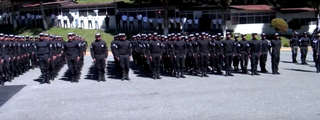
The Special Action Forces is an elite command of the Venezuelan National Police created in April 2016. By 2019, it had around 1,300 officers. The FAES includes the Unidad de Operaciones Tácticas Especiales (UOTE) a police tactical unit. The FAES have been accused of being a political instrument of Nicolás Maduro, as well as being a death squad and of repressing the opposition.

La Salida was a Venezuelan opposition political campaign launched on 23 January 2014 that was based on civil disobedience in an effort to bring an end to the government of President of Venezuela Nicolás Maduro.
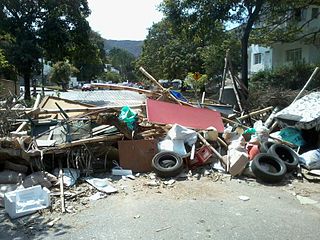
Guarimba is a term colloquially used in Venezuela for a protest method primarily used by the Venezuelan opposition that involves erecting street barricades or roadblocks. Although the erection of barricades in Venezuela dates back decades, the term has gained relevance during protests against the governments of Hugo Chávez and Nicolás Maduro, when it has become a pejorative and stigmatizing term. Venezuelan officials have used the term to disqualify and criminalize the opposition or opposition demonstrations.
The International Independent Fact-Finding Mission on the Bolivarian Republic of Venezuela is an observation body established in 2019 to study the human rights situation under the Bolivarian Revolution.

The Bachelet report is the name given from the press to reports presented between 2019 and 2022 by then-United Nations High Commissioner for Human Rights, Michelle Bachelet, on the situation of the human rights in Venezuela, which was endorsed later by the United Nations Human Rights Council and opened the Independent International Fact-Finding Mission on Venezuela.


















